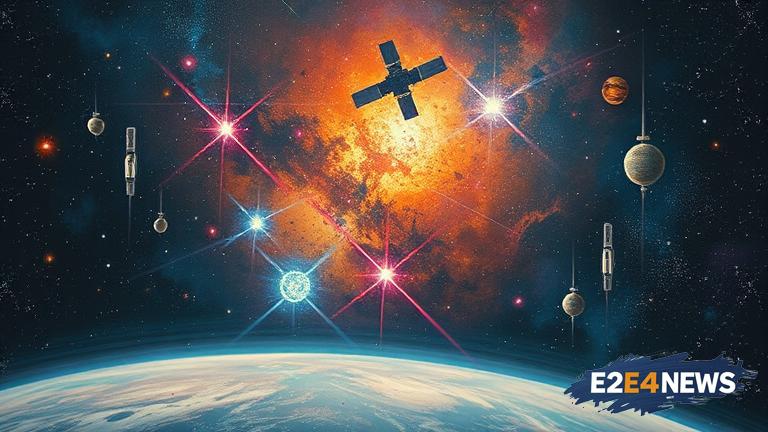The universe is a vast and wondrous place, full of mysteries waiting to be unraveled. However, the increasing number of satellites in Earth’s orbit is causing a surge in radio frequency interference, potentially silencing the universe and hindering our ability to detect deep space signals. This phenomenon is not only affecting our ability to study the universe but also posing a significant threat to the future of radio astronomy. The main culprit behind this interference is the massive constellation of satellites being launched by companies like SpaceX and OneWeb. These satellites are designed to provide global internet coverage, but they are also emitting a significant amount of radio frequency energy into space. This energy is interfering with the sensitive instruments used by radio astronomers to study the universe. The problem is not limited to just a few satellites, but rather it is a collective issue caused by the thousands of satellites that are currently in orbit. The interference is not only affecting the detection of deep space signals but also making it difficult for astronomers to study the universe in general. The situation is becoming increasingly dire, with some astronomers warning that the universe could be completely silenced within the next few decades. The impact of this interference is not limited to just radio astronomy, but it also has significant implications for our understanding of the universe and its many mysteries. The universe is a complex and dynamic place, and the loss of radio astronomy capabilities would be a significant setback for our understanding of the cosmos. Furthermore, the silencing of the universe would also have significant implications for the search for extraterrestrial intelligence. The search for life beyond Earth is an ongoing effort, and the loss of radio astronomy capabilities would make it even more challenging. The problem of satellite interference is not a new one, but it has become increasingly pressing in recent years. The launch of large constellations of satellites has exacerbated the issue, and it is now becoming a major concern for the scientific community. The solution to this problem is not a simple one, and it will require a concerted effort from governments, companies, and the scientific community. One possible solution is to implement stricter regulations on the launch of satellites and the use of radio frequency energy. Another solution is to develop new technologies that can mitigate the effects of satellite interference. The development of new technologies, such as advanced signal processing algorithms and more sensitive instruments, could help to reduce the impact of satellite interference. However, these solutions will require significant investment and research, and it is unclear whether they will be enough to completely mitigate the problem. The issue of satellite interference is a complex one, and it will require a sustained effort to address. The scientific community is working to raise awareness about the issue and to develop solutions, but it will be an ongoing challenge. The universe is a precious resource, and it is our responsibility to protect it. The silencing of the universe would be a tragedy, and it is our duty to ensure that it does not happen. The situation is urgent, and it requires immediate attention. The future of radio astronomy and our understanding of the universe depend on it. The clock is ticking, and it is time for us to take action. We must work together to address the issue of satellite interference and to ensure that the universe remains a place of wonder and discovery for generations to come. The universe is a mysterious and awe-inspiring place, and it is our duty to protect it. We owe it to ourselves, our children, and future generations to ensure that the universe remains a place of discovery and wonder. The issue of satellite interference is a wake-up call, and it is time for us to take action. We must work together to address this issue and to ensure that the universe remains a place of beauty and mystery for years to come.





